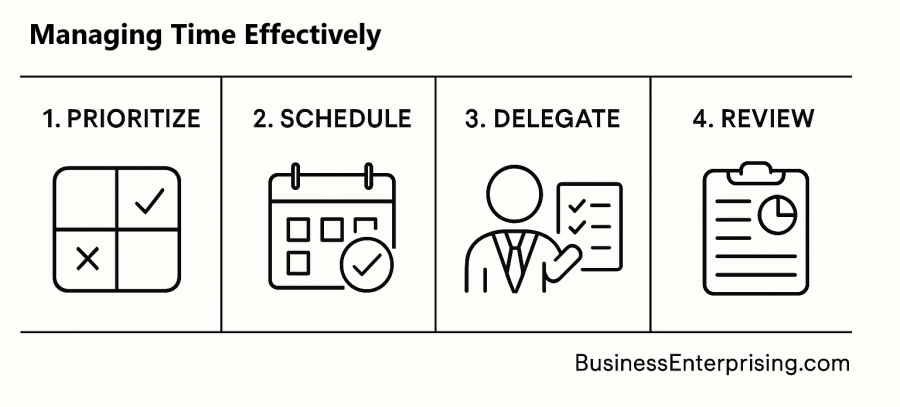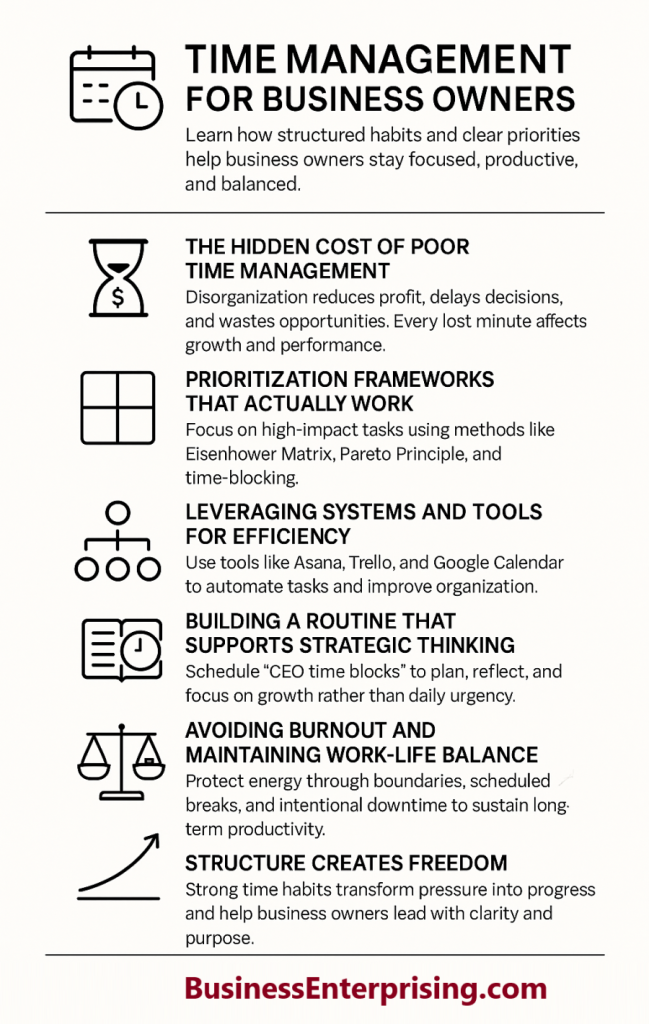 Time is the one resource every business owner shares, yet few manage it effectively. Each day brings competing priorities, unexpected challenges, and endless tasks demanding your attention. Without structure, your focus scatters and progress slows. Therefore, developing strong habits around scheduling, prioritization, and delegation becomes essential. Effective time management for business owners is not about doing more but about doing what matters most.
Time is the one resource every business owner shares, yet few manage it effectively. Each day brings competing priorities, unexpected challenges, and endless tasks demanding your attention. Without structure, your focus scatters and progress slows. Therefore, developing strong habits around scheduling, prioritization, and delegation becomes essential. Effective time management for business owners is not about doing more but about doing what matters most.
Many business owners spend their days reacting instead of planning. However, this constant urgency prevents thoughtful decision-making and limits growth. When your time is controlled by interruptions, your creativity and leadership decline. Therefore, shifting from reaction to intention creates the foundation for consistent progress. Additionally, structured routines help you balance strategic thinking with daily operations. With discipline, you gain control over your time instead of being controlled by it.
Good time management starts with clarity. You need to know where your hours go and what activities bring the greatest return. Therefore, start by identifying high-impact tasks and removing distractions that do not move your business forward. Additionally, create systems that simplify communication, automate repetitive work, and set boundaries around your focus time. Small improvements in structure quickly compound into measurable results.
When you manage time intentionally, you create space for growth, creativity, and reflection. Your productivity rises without adding pressure to your schedule. Therefore, you make better decisions and lead with confidence. Each hour becomes a deliberate investment in your business rather than a reaction to chaos. Over time, structured habits turn into sustainable success.
The Hidden Cost of Poor Time Management
Poor time management affects every level of your business. When tasks pile up and schedules lack structure, your productivity drops and profitability follows. You may find yourself reacting instead of planning, which leads to missed opportunities and lower-quality outcomes. Even small delays in decision-making can ripple through your team and create unnecessary confusion. Over time, those delays translate into lost revenue and rising stress levels.
Many business owners underestimate how much time is lost to disorganization. However, searching for misplaced information or redoing incomplete work adds hidden costs that drain energy and focus. Additionally, constant interruptions make it harder to stay aligned with business priorities. When you cannot focus on long-term goals, you spend more hours putting out fires than building growth. Therefore, investing time in better structure pays off through smoother operations and clearer thinking.
Consider a small retail owner who spends hours managing inventory manually. Because the system is inefficient, reorders are delayed, and sales drop during peak demand. Another example is a consultant who fills their day with low-value meetings, leaving no time for strategy or client acquisition. Both scenarios reflect how poor organization reduces capacity for growth. Effective time management for business owners means identifying where hours are lost and applying structure before inefficiency becomes costly.
Ultimately, time is your most limited resource. When it is misused, decisions suffer and your team loses direction. However, when you regain control through planning, prioritization, and delegation, productivity rises naturally. Your focus shifts from survival to strategy, and profitability follows.
Prioritization Frameworks That Actually Work
Effective prioritization is one of the most powerful tools for improving how you work each day. When your to-do list feels endless, clear frameworks help you identify what truly matters. You gain focus, reduce decision fatigue, and make better use of your time. This structured approach to planning is a key part of effective time management for business owners who juggle multiple responsibilities.
The Eisenhower Matrix is a simple method that helps you separate tasks by urgency and importance. By sorting tasks into four categories, you can quickly identify what needs your attention and what can be delegated or delayed. Therefore, you stop spending time on low-impact work that adds little value. Additionally, this approach encourages you to make thoughtful choices rather than reacting to constant distractions.
Another useful method is the Pareto Principle, also known as the 80/20 rule. It suggests that roughly 80 percent of your results come from 20 percent of your efforts. When you focus on that small percentage of high-impact activities, productivity increases dramatically. For example, spending more time on client relationships or strategic planning often produces greater returns than handling minor tasks.
Time-blocking adds another layer of structure. By assigning specific time periods to particular activities, you reduce multitasking and protect your focus. Therefore, your workday feels more intentional, and you gain better control of your schedule. Additionally, this approach helps you identify when your energy is highest and match it with demanding work. With consistent use of these frameworks, you learn to manage attention instead of reacting to busyness. As your priorities become clearer, every hour contributes more effectively to long-term goals.
Leveraging Systems and Tools for Efficiency
Efficient systems are the foundation of a productive business. When your operations rely on structured tools and clear processes, time waste disappears. You can automate repetitive tasks, track progress, and focus your attention on growth. This approach makes time management for business owners far more strategic and sustainable.
Digital tools make organization simple and measurable. Applications like Asana or Trello allow you to assign tasks, set deadlines, and track completion with ease. Therefore, you can monitor multiple projects without losing visibility or control. Additionally, shared dashboards improve accountability among your team and prevent important tasks from falling through the cracks. When everyone knows their responsibilities, projects move faster and stress levels drop.
Scheduling tools also play a major role in staying organized. Google Calendar helps you structure each day with clear time blocks. Therefore, you can plan meetings, breaks, and deep work sessions without overlap. Additionally, automated reminders prevent missed appointments and reduce mental clutter. With clear visibility of your schedule, you make better decisions about where to spend your energy.
Automation tools like Zapier save hours each week by connecting apps and eliminating manual data entry. For example, client inquiries can automatically feed into project boards or email lists. Therefore, your processes run in the background while you focus on strategy and leadership. Additionally, automation reduces human error and improves consistency in communication.
When you combine project management, scheduling, and automation tools, your business operates like a coordinated system. You free yourself from busywork and gain more time for innovation. Structured efficiency builds momentum, and consistent organization drives long-term growth.
The Power of Delegation and Team Accountability
Delegation is one of the strongest habits you can develop as a business owner. It allows you to focus on leadership rather than daily operations. However, delegation only works when it is intentional and structured. When you hand off tasks without guidance, you create confusion instead of efficiency. The goal is to assign ownership, not abandon responsibility. This mindset shift is a core part of effective time management for business owners who want long-term stability.
True delegation starts with clarity. You must define the outcome you expect, the deadline, and the metrics for success. Therefore, your team knows exactly how to measure their progress and what results to deliver. Additionally, setting clear expectations prevents misunderstandings and repeated corrections. When every person understands their role, performance naturally improves. Consistency in communication builds accountability across all departments.
Abdication, on the other hand, happens when tasks are handed off without structure or follow-up. This leads to mistakes, rework, and frustration on both sides. Therefore, regular check-ins and measurable KPIs are necessary to maintain alignment. Additionally, short weekly meetings or progress reports help you identify issues early. These small actions save significant time and prevent small problems from growing.
When you delegate effectively, you empower others while freeing yourself to focus on strategy and innovation. Your time becomes more valuable because it drives growth rather than maintenance. Additionally, a culture of accountability builds trust and strengthens your leadership. Over time, structured delegation reduces burnout and creates a more efficient, independent team.
Building a Routine that Supports Strategic Thinking
A structured routine creates the foundation for clear thinking and effective leadership. When your day has rhythm and consistency, decisions feel less rushed and more deliberate. You create space for creativity, problem-solving, and long-term planning. Without structure, your schedule becomes reactive, and priorities blur together. Therefore, daily organization becomes an essential part of effective time management for business owners.
Strategic thinking requires mental space, not constant activity. Therefore, blocking out uninterrupted time helps you move from urgent tasks to meaningful reflection. Many successful leaders use “CEO time blocks” to focus solely on planning, innovation, or key decisions. Additionally, setting these sessions during your peak energy hours increases focus and reduces distractions. When you give yourself structured time to think, you begin leading instead of simply managing.
Consistency matters more than volume. A short, focused session each morning can set the tone for the entire day. Therefore, establish routines for reviewing priorities, planning meetings, and evaluating progress. Additionally, closing your day with reflection helps you learn from small wins and setbacks. These simple habits improve clarity and keep long-term goals visible amid daily operations.
Routine does not mean rigidity. You can still adapt your schedule as business demands shift. However, maintaining consistent time blocks for strategy protects your ability to make thoughtful decisions. Over time, this practice strengthens leadership and improves overall productivity. With steady routines and intentional focus, you build a business guided by purpose rather than pressure.
Avoiding Burnout and Maintaining Work-Life Balance
Burnout often begins quietly when your schedule fills faster than your energy can recover. Long hours and constant decisions eventually drain focus and motivation. Effective time management is not only about working harder but about protecting your mental and physical well-being. Therefore, balance becomes a central part of sustainable success. Healthy structure supports productivity without sacrificing your personal life, making balance an important part of time management for business owners.
Setting clear boundaries is the first step toward preventing burnout. You must separate business hours from personal time to protect recovery. Therefore, decide when your workday ends and honor that commitment. Additionally, reduce unnecessary meetings and delegate tasks that others can handle. When you limit distractions and interruptions, your workload becomes more manageable. Regular breaks also allow your mind to reset, which improves creativity and focus throughout the day.
Decision fatigue is another common drain on productivity. Making constant choices depletes energy and leads to poor judgment. Therefore, simplify routine decisions through structured planning. For example, schedule specific time blocks for administrative work, creative thinking, or rest. Additionally, plan meals, clothing, or workout times in advance to free up mental space. Every small reduction in decision-making strengthens your ability to stay sharp.
Rest should be treated as a responsibility, not an afterthought. Sleep, exercise, and personal downtime directly affect your effectiveness as a leader. Therefore, schedule these with the same discipline you apply to meetings. Additionally, learning to pause helps you maintain perspective and long-term motivation. When your routine includes rest, boundaries, and reflection, you lead from stability rather than exhaustion.
Conclusion
Managing your time effectively is not about filling every minute. It is about aligning your actions with meaningful goals. When you treat your schedule as a reflection of your priorities, you begin to regain control of your business and your life. Therefore, effective planning becomes the foundation of smarter decision-making. This approach transforms daily activity into measurable progress rather than endless motion.
Consistency in structure builds confidence and clarity. When your schedule follows a rhythm, your mind has space to focus on what matters most. Therefore, you can think strategically, lead with purpose, and respond thoughtfully to challenges. Additionally, routine planning prevents small tasks from becoming distractions. Every decision about how you spend your time shapes your overall performance.
Delegation, prioritization, and structured tools all support lasting productivity. However, balance matters as much as output. Therefore, maintaining rest, reflection, and boundaries protects your energy for long-term growth. When you lead by example, your team learns that discipline and flexibility can coexist. Additionally, systems built around clear communication and accountability allow you to operate efficiently without losing focus.
Effective time management for business owners is not a short-term tactic. It is a continuous practice that shapes both business outcomes and personal well-being. Therefore, treat time as your most valuable resource and protect it carefully. When your calendar reflects strategy rather than stress, your business grows with purpose. Over time, better control of your schedule brings more freedom, focus, and fulfillment in your work.



